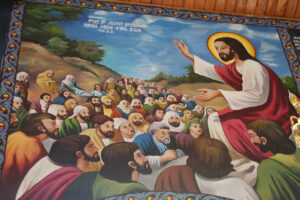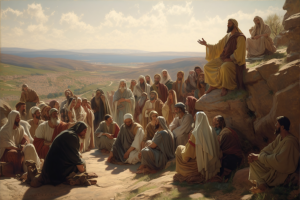God bless you! You’ve hung in here for four Posts as we’ve looked at Christ’s great Sermon, His teachings about Christian living in Matthew Chapters 5 and 6 and, finally today, Chapter 7. *
- “Chapter 7″? Did you know: For most of Christian history there was no Chapter 7. The Bible was
 originally written in straight text – without being divided into the chapters and verses we take for granted. (“Where are the Beatitudes?” “They’re in Matthew somewhere. Just read until you find them.”) Division into chapters was invented apparently by Archbishop of Canterbury Cardinal Stephen Langton in the Thirteenth Century. Versification didn’t come along till the Sixteenth Century.
originally written in straight text – without being divided into the chapters and verses we take for granted. (“Where are the Beatitudes?” “They’re in Matthew somewhere. Just read until you find them.”) Division into chapters was invented apparently by Archbishop of Canterbury Cardinal Stephen Langton in the Thirteenth Century. Versification didn’t come along till the Sixteenth Century.
Please forgive the digression. On to Chapter Seven (God bless you, Cardinal Langton) of the Gospel according to Saint Matthew:

I think it is generally agreed that Matthew’s three-chapter “Sermon on the Mount” is a compilation of elements of the basic sermon which Jesus preached many times with many variations as He traveled from place to place, from synagogue to synagogue.
I’d guess that Chapter Seven consists of various teachings of the Lord which Matthew placed here because they didn’t seem to fit anywhere else. At least, I can’t see a systematic plan that connects them, one to another. Can you?
Matthew 7:1-5
“Judge not, that you be not judged. For with what judgement you judge, you will be judged; and with the measure you use, it will be measured back to you. And why do you look at the speck in your brother’s eye, but do not consider the plank in your own eye? Or how can you say to your brother, ‘Let me remove the speck from your eye’; and look, a plank is in your own eye? Hypocrite! * First remove the plank from your own eye, and then you will see clearly to remove the speck from your brother’s eye.”
- “Fake!”
 A plank in my eye indeed! Another example of our Lord’s (forgive me) “off the wall” imagery – designed to make people wake up and pay attention and remember.
A plank in my eye indeed! Another example of our Lord’s (forgive me) “off the wall” imagery – designed to make people wake up and pay attention and remember.
Don’t misunderstand. We must judge actions. Shooting innocent people (children!) at close range, beheading them, kidnapping them * is wrong, so horribly wrong! Keeping 2 million people trapped, unable to leave, in a tiny space (check the map, lower left – 25,000 people per square mile – for decades * is wrong. Purposely spreading lies on the internet * is wrong. Husbands beating up their wives * is wrong. These things and many more we must judge to be wrong. It would be irresponsible not to.
- Some current events as of October 14, 2023.
What our Lord commands is that we not judge people. Why is that wrong? Because only God can see into the depths of peoples’ hearts and souls and minds and know why they do what they do. It’s wrong for you and me to judge people, not because it’s naughty, but because it is impossible for us to do so.
Why will we judged with the same judgment? Because our job is to judge ourselves, as best we can. Do not read Christ’s commandments and think, “Well, that certainly applies to him!” – while we should be spending the same time dealing with our own sins and failures. Indeed, we all have a tendency to spot sins in other people which plague us as well, do we not?
However, we need to be careful even about judging ourselves. As modern psychology has affirmed, there is much going on deep within each of us that even we ourselves are unaware of. I think Saint Paul knew this. He wrote, “I care very little if I am judged by you or by any human court; indeed, I do not even judge myself. My conscience is clear, but that does not make me innocent. It is the Lord who judges me.” 1 Corinthians 4:1
Father Tom Hopko advised “Be merciful with yourself and with others”.
Matthew 7:6
“Do not give what is holy to the dogs; nor cast your pearls before swine, lest they trample them under their feet, and turn and tear you in pieces.” This is a perplexing verse. I wonder if Jesus was speaking specifically to a situation at the time which we don’t know about. Why would He call people “swine”, “dogs”?
Perhaps the pearls are Christ’s “pearls of wisdom”, His teachings. If we must choose between trying to share Him with people who haven’t the slightest interest, or with an eager, receptive audience, which should we choose? He told His Apostles, if people won’t receive you “shake the dust off your feet” and move on. Matthew 10:14
Matthew 7:7-12
 “Ask, and it will be given to you; seek, and you will find; knock, and it will be opened to you. For everyone who asks receives, and he who seeks finds, and to him who knocks it will be opened. Or what man is there among you who, if his son asks for bread, will give him a stone? Or if he asks for a fish, will he give him a serpent? If you then, who are evil, know how to give good gifts to your children, how much more will your Father who is in heaven give good things to those who ask Him!”
“Ask, and it will be given to you; seek, and you will find; knock, and it will be opened to you. For everyone who asks receives, and he who seeks finds, and to him who knocks it will be opened. Or what man is there among you who, if his son asks for bread, will give him a stone? Or if he asks for a fish, will he give him a serpent? If you then, who are evil, know how to give good gifts to your children, how much more will your Father who is in heaven give good things to those who ask Him!”
Again, clever imagery which caught attention. People immediately could see themselves knocking. Every father there tried to imagine himself giving his children stones to eat, or snakes! And how many fathers thought of themselves as “evil”? Very few, I’d guess.
This, of course, is a teaching to be persistent in prayer, in faith. Remember the parable of the widow and the unjust judge? (Read it if you do not: Luke 18:1–8) The moral is persistence. What? If even an uncaring judge finally responds because she kept nagging him day and night, “will not God bring about justice for his chosen ones, who cry out to him day and night?”
I love this guarantee from the Lord – “Seek and you will find.” – but I think it’s problematic. On the one hand, God has granted me almost all the good things in life which I have sought – and I praise Him for it day and night. But there are so many who have sought and not found . Have the good Orthodox people of Ukraine whose country is being destroyed * not sought from God hard enough? or good Christian people in the United States who live in poverty? Or are those not the “good things” which our Father will grant? If not, what are they? Something better than either snakes or bread? I guess in many cases, the place where people “find” and “receive” must be when the door is opened into the Kingdom beyond this age. Perhaps that is why the parable of the nagging widow concludes like this: “But when the Son of Man comes, will he find faith on earth?” Will people still be trusting in God’s promise?
. Have the good Orthodox people of Ukraine whose country is being destroyed * not sought from God hard enough? or good Christian people in the United States who live in poverty? Or are those not the “good things” which our Father will grant? If not, what are they? Something better than either snakes or bread? I guess in many cases, the place where people “find” and “receive” must be when the door is opened into the Kingdom beyond this age. Perhaps that is why the parable of the nagging widow concludes like this: “But when the Son of Man comes, will he find faith on earth?” Will people still be trusting in God’s promise?
- Please don’t forget them. They’re almost getting lost amidst all the world’s other problems now.
Matthew 7:11
“Therefore, whatever you want men to do to you, do also to them, for this is the Law and the Prophets.”
The Golden Rule. I read that this Rule is common to all religions – though in some cases it is expressed negatively. In Buddhism, for example: “Whatever is disagreeable to yourself, do not do unto others.” Islam has the same positive expression as do Christians: “Do to all men as you would wish to have done to you.” This is not surprising because, as Saint John of Damascus pointed out, Islam is at heart a Christian heresy.
But if all religions share the Golden Rule.., then why is the world in such a mess? Is nobody paying any attention?
Matthew 7:14

“Enter by the narrow gate; for wide is the gate and broad is the way that leads to destruction, and there are many who go in by it. Because narrow is the gate and difficult is the way which leads to life, and there are few who find it.”
What exactly is the Narrow Way? “I am the Way, the Truth and the Life.” John 14:6 But is it enough simply to “give my heart to Jesus, and I’m saved”, as some say? It takes a whole lot more than that to follow Christ up that “difficult” narrow way and through that narrow gate. Are there truly “few who find it”? That is a frightening line.
Matthew 7:15-20
 “Beware of false prophets, who come to you in sheep’s clothing, but inwardly they are ravenous wolves. You will know them by their fruits. Do men gather grapes from thorn bushes or figs from thistles? Even so, every good tree bears good fruit, but a bad tree bears bad fruit. A good tree cannot bear bad fruit, nor can a bad tree bear good fruit. Every tree that does not bear good fruit is cut down and thrown into the fire. Therefore by their fruits you will know them.”
“Beware of false prophets, who come to you in sheep’s clothing, but inwardly they are ravenous wolves. You will know them by their fruits. Do men gather grapes from thorn bushes or figs from thistles? Even so, every good tree bears good fruit, but a bad tree bears bad fruit. A good tree cannot bear bad fruit, nor can a bad tree bear good fruit. Every tree that does not bear good fruit is cut down and thrown into the fire. Therefore by their fruits you will know them.”
More memorable imagery. (See above, for example.)
As I said, most of Christ’s teachings are intended to apply to me, not to other people.
Now, however, we come to these verses about how we should evaluate them, people around us. How should we know whether they are of God or not? What exactly are the “good fruits”? Turn to Galatians 5:22-23: “The fruit of the Spirit is love, joy, peace, patience, kindness, goodness, faithfulness, gentleness and self-control.” Anyone who does not bear these fruits – no matter how “Orthodox” they may be, no matter how theologically or liturgically or politically correct, no matter how intelligent, no matter how powerful, no matter how convincing – is not of God.
And if they bear the “works of the flesh”: “sexual immorality, impurity, sensuality, idolatry, sorcery, enmity, strife, jealousy, fits of anger, rivalries, dissensions, divisions, envy, drunkenness, orgies, and things like these…” Galatians 5: 19-21 … head for the hills, brothers and sisters. I think especially of the “anger, rivalries, dissensions, divisions”, which trouble so many parishes. These things are never of God. Do not get involved with them, and (God help you) do not ever be the source of them.
Matthew 7:21-23
“Not everyone who says to Me, ‘Lord, Lord,’ shall enter the kingdom of heaven, but he who does the will of My Father in heaven. Many will say to Me in that day, ‘Lord, Lord, have we not prophesied in Your name, cast out demons in Your name, and done many wonders in Your name?’ And then I will declare to them, ‘I never knew you; depart from Me, you who practice lawlessness!’”
Now, that’s scary. I think it follows on the previous verses. I’ve read the commentaries of certain evangelical Protestants on these verses, which seem to counter their belief that once you give your life to Jesus, saying “Lord, Lord, I believe”, salvation is guaranteed. Is it? No, it is not. Even the great Saint Paul, who had given Himself entirely to the Lord and had brought thousands to Christ, worried “lest after I have preached to others, I myself will not be disqualified for the prize.” 1 Corinthians 9:27
So what qualifies us for the “prize” of eternal life? Must we have attained spiritual and moral perfection in this life? (Oh, I hope not, because in that case there will be nobody in Heaven except Jesus and His Blessed Mother.) Must we have “done the best we could”? (But none of us have.) Must we never have fallen off the “way”, never ever turned away from following Christ? (I hope that’s not required, because here again I think none of us will quality.)
 I think, I hope, I pray that all that is required is that we come to the end of our lives still plugging away, still trusting, still following Jesus in our inadequate way. That when we fell away, we returned to Christ and the Way again, repentant. We never gave up, never gave up, never gave up trying. And I hope that then our Great Journey towards the fullness of holiness and joy with our Lord Christ which began in this life will continue into the next.
I think, I hope, I pray that all that is required is that we come to the end of our lives still plugging away, still trusting, still following Jesus in our inadequate way. That when we fell away, we returned to Christ and the Way again, repentant. We never gave up, never gave up, never gave up trying. And I hope that then our Great Journey towards the fullness of holiness and joy with our Lord Christ which began in this life will continue into the next.
Matthew 7:24-27

“Therefore whoever hears these sayings of Mine, and does them, I will liken him to a wise man who built his house on the rock: and the rain descended, the floods came, and the winds blew and beat on that house; and it did not fall, for it was founded on the rock.
“But everyone who hears these sayings of Mine, and does not do them, will be like a foolish man who built his house on the sand: and the rain descended, the floods came, and the winds blew and beat on that house; and it fell. And great was its fall.”
Again, brilliant clear inspiring frightening imagery.
Matthew 7:28-29
Matthew brings it to a close:
“And so it was, when Jesus had ended these sayings, that the people were astonished at His teaching, for He taught them as one having authority, and not as the scribes.”
What drew so many people – enormous crowds – to hear Jesus?
Partly it was the way He taught – with stories, parables, outlandish memorable images – “the log in my eye”! Who could forget that? I guess it shouldn’t surprise us that He through whom all things were created should be a creative teacher.
Partly it was His audacity. Who is this man who says he alone has the key to everlasting life, that when all else falls apart, his words alone will endure? This young man, scarcely thirty years old, who hasn’t even gone to rabbinic school. Where does he get all this?
Partly it was what He taught: “not like the Scribes” who, when asked a question, searched the Scriptures or the Talmud. “Let me look it up… Here. The answer is in Leviticus 15”. Jesus quoted the Scriptures certainly, but He taught with authority, as if He knew within Himself what was true, what was false, as if He Himself had almost “been there”, as if He Himself knew the Source of it all.
I suspect that, even more, it was the Man Himself. He was compelling, with a charismatic personality that just drew people to Him.
 Brothers and sisters, we have heard Christ’s teachings so often that we take them for granted, sometimes don’t even hear them. Now…put yourself in the crowd standing a little below your Lord Jesus on the hillside, and as you read His teachings, try to hear them as if you were hearing them, hearing Him for the first time. And be astonished!
Brothers and sisters, we have heard Christ’s teachings so often that we take them for granted, sometimes don’t even hear them. Now…put yourself in the crowd standing a little below your Lord Jesus on the hillside, and as you read His teachings, try to hear them as if you were hearing them, hearing Him for the first time. And be astonished!
Next Week: We’ll hark back to October11, and three First Century apostolic sisters I had scarcely heard of before, who were in many ways the Mothers of Christian medical practice.
Week after Next: Boo
Thank you, Fr Bill. You rejuvenate me
Thank you. It rejuvenates me to know you appreciate them.